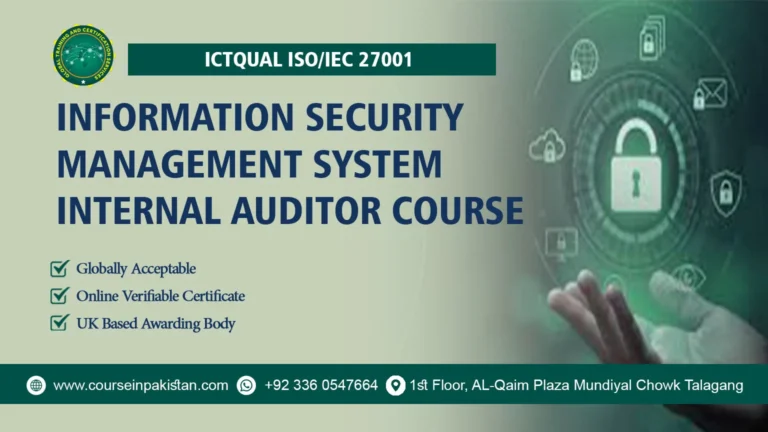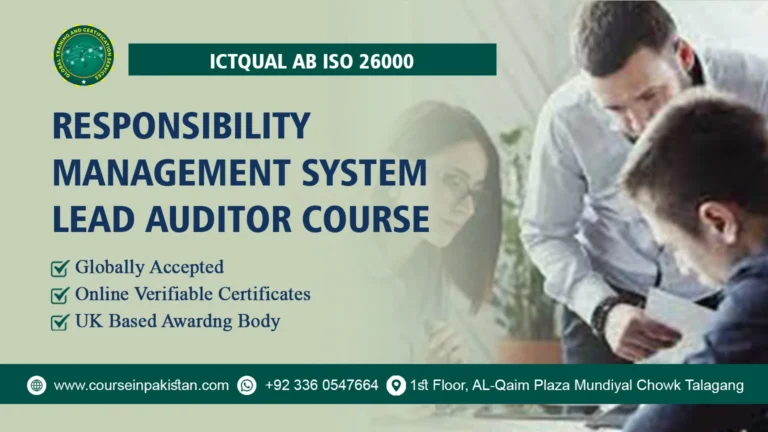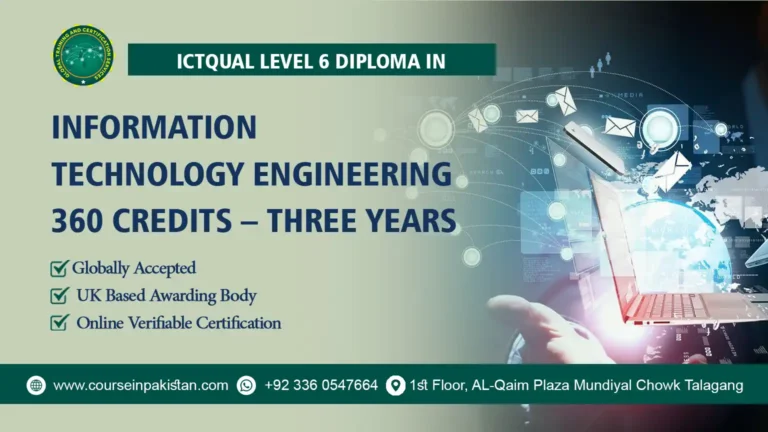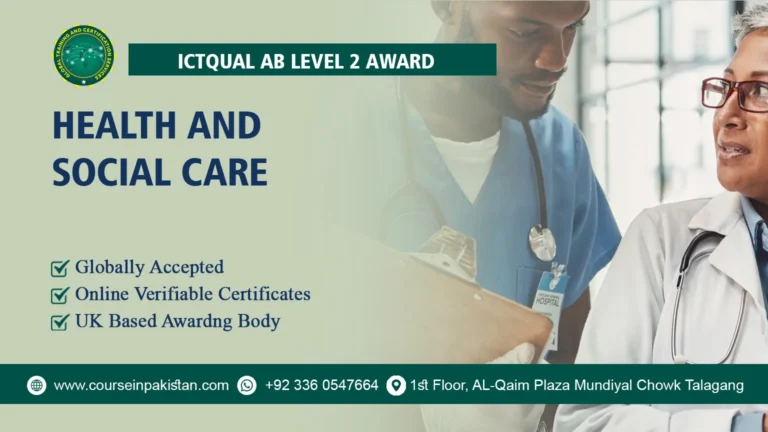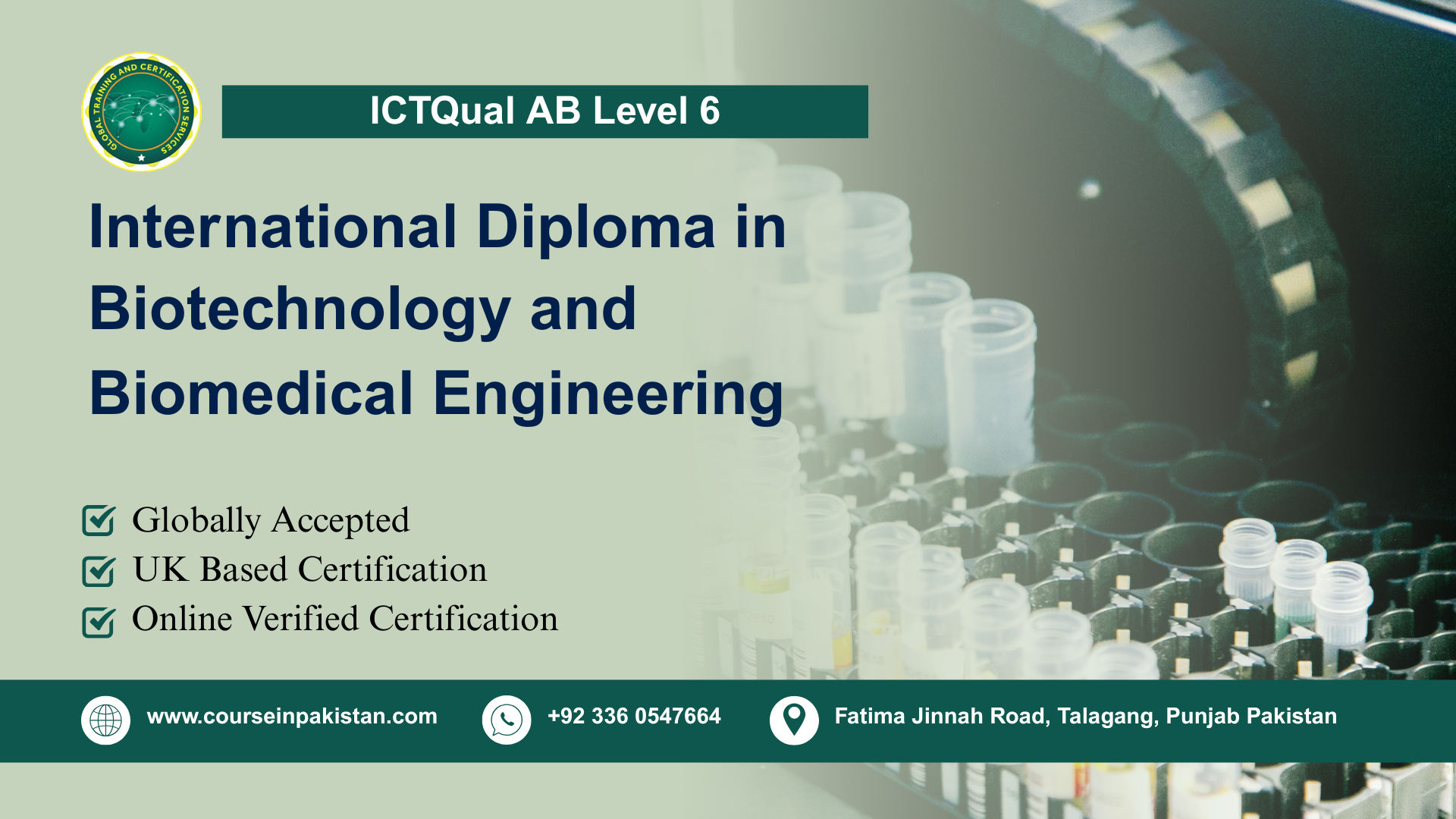
The ICTQual AB Level 6 International Diploma in Biotechnology and Biomedical Engineering is a comprehensive program designed to equip learners with advanced knowledge and practical skills in biotechnology, biomedical engineering, and healthcare innovation. This course covers key areas including molecular biology, tissue engineering, bioinformatics, bioprocessing, regenerative medicine, and biomedical device design. Learners will gain expertise in research methodologies, laboratory techniques, and emerging technologies, preparing them to contribute effectively to healthcare, research, and industrial biotechnology sectors globally.
This qualification is ideal for both fresh students and experienced professionals. Fresh learners will complete all 36 mandatory assignments over three years, developing a strong theoretical foundation along with practical competencies. Experienced professionals can fast-track their certification by submitting verifiable six years of relevant experience and demonstrating their expertise through professional discussion meetings with an ICTQual AB approved assessor. This flexibility allows learners to advance their careers at their own pace, from anywhere in the world, while gaining a British Council verifiable, MOF
Course Overview
The ICTQual AB Level 6 International Diploma in Biotechnology and Biomedical Engineering is a 360-credit, fully assignment-based qualification that allows learners to study at their own pace from anywhere in the world. This internationally recognized certification is British Council verifiable, MOFA and Embassy attestable, making it highly suitable for employment opportunities and Iqama approval. The program is designed to cater to both fresh learners and experienced professionals seeking advanced knowledge and practical expertise in biotechnology, biomedical engineering, and healthcare innovation.
Fresh students are required to complete all 36 mandatory assignments within three years, gaining comprehensive theoretical knowledge and hands-on skills in molecular biology, tissue engineering, bioprocessing, bioinformatics, and biomedical device design. Experienced professionals can pursue this certification by submitting verifiable at least six years of relevant experience and demonstrating their expertise through professional discussion meetings with an ICTQual AB approved assessor, enabling them to complete the qualification in a shorter time without completing all mandatory assignments.
Key Highlights of the Course:
- 360-credit, fully assignment-based international diploma allowing self-paced learning from anywhere in the world
- British Council verifiable, MOFA and Embassy attestable, suitable for job and Iqama approval
- Comprehensive coverage of molecular biology, biomedical engineering, bioprocessing, bioinformatics, and biomedical devices
- Suitable for both fresh students (36 assignments over 3 years) and experienced professionals (shortened pathway via professional discussion)
- Focus on practical skills, research, and emerging technologies in biotechnology and healthcare innovation
Course Benefits
1. Career Advancement
- Gain access to specialized roles in biotechnology, biomedical engineering, and healthcare technology
- Opportunities in research, biopharmaceutical production, medical device development, and regenerative medicine
2. Flexible Learning
- Study at your own pace from anywhere in the world
- Complete the diploma through assignment-based assessments or a fast-track pathway for experienced professionals
3. Practical and Research Skills
- Develop laboratory, analytical, and research skills
- Apply evidence-based techniques in biotechnology, biomedical engineering, and healthcare solutions
4. International Recognition
- British Council verifiable, MOFA and Embassy attestable certification
- Boosts employability, career progression, and professional credibility
5. Professional Development
- Enhance leadership, communication, and project management skills
- Prepare for higher studies, consultancy roles, or specialized positions in biotechnology and biomedical engineering
Course Study Units
This qualification, the ICTQual AB Level 6 International Diploma in Biotechnology & Biomedical Engineering 360 Credits – Three Years, consists of 36 mandatory units.
Year 1: Foundation in Biotechnology & Biomedical Engineering
- Introduction to Biotechnology and Biomedical Engineering
- Fundamentals of Human Anatomy and Physiology
- Principles of Molecular Biology and Genetics
- Biochemistry for Life Sciences
- Microbiology and Infection Control
- Laboratory Safety and Quality Assurance
- Principles of Pharmacology and Therapeutics
- Mathematics and Statistics for Biomedical Applications
- Computer Applications in Biotechnology
- Communication Skills for Science and Healthcare Professionals
- Introduction to Research and Evidence-Based Practice
- Ethics and Professional Conduct in Biomedical Sciences
Year 2: Intermediate Biotechnology & Biomedical Engineering Applications
- Genetic Engineering and Recombinant DNA Technology
- Cell Biology and Tissue Engineering
- Clinical Biochemistry and Diagnostic Techniques
- Immunology and Serology
- Instrumentation and Analytical Methods in Biotechnology
- Microbial Biotechnology and Industrial Applications
- Molecular Diagnostics and Laboratory Techniques
- Bioprocess Engineering and Biomanufacturing
- Data Analysis and Biomedical Informatics
- Health and Safety in Biomedical Laboratories
- Leadership and Teamwork in Scientific Practice
- Applied Research Methods and Experimental Design
Year 3: Advanced Specialisation and Professional Application
- Advanced Molecular Biology and Genomics
- Advanced Immunology and Clinical Applications
- Biomedical Device Engineering and Design
- Advanced Bioprocessing and Biopharmaceutical Production
- Stem Cell Technology and Regenerative Medicine
- Bioinformatics and Computational Biology
- Clinical Trial Design and Regulatory Compliance
- Advanced Laboratory Techniques and Automation
- Quality Management and Risk Assessment in Biomedicine
- Emerging Technologies in Biotechnology and Healthcare
- Research Project / Dissertation
- Professional Practice and Practical Competency Assessment
Learning Outcomes
Year 1 – Foundation in Biotechnology & Biomedical Engineering
1. Introduction to Biotechnology and Biomedical Engineering
- Understand core principles of biotechnology and biomedical engineering
- Explain the role of biotechnology in healthcare, industry, and research
- Identify career pathways and applications in biomedical sciences
2. Fundamentals of Human Anatomy and Physiology
- Describe the structure and function of human body systems
- Relate anatomical knowledge to biomedical engineering and biotechnology applications
- Apply physiological principles to problem-solving in healthcare contexts
3. Principles of Molecular Biology and Genetics
- Explain molecular and genetic processes in cells
- Apply knowledge to laboratory experiments and genetic research
- Analyze the role of genetics in disease and therapeutic interventions
4. Biochemistry for Life Sciences
- Understand biochemical pathways and molecular interactions
- Apply biochemical knowledge to research and biomedical applications
- Interpret experimental results in biochemical studies
5. Microbiology and Infection Control
- Identify microorganisms and their impact on health and industry
- Implement laboratory and clinical infection control measures
- Analyze strategies for preventing microbial contamination
6. Laboratory Safety and Quality Assurance
- Apply safety protocols in laboratory environments
- Understand quality assurance standards in biomedical labs
- Maintain compliance with health, safety, and ethical regulations
7. Principles of Pharmacology and Therapeutics
- Explain drug actions, interactions, and therapeutic applications
- Apply pharmacological principles to biomedical practice
- Evaluate medication safety and efficacy in healthcare contexts
8. Mathematics and Statistics for Biomedical Applications
- Apply statistical methods to biological and biomedical data
- Use mathematical modeling in experimental design and data analysis
- Interpret results to support evidence-based decisions
9. Computer Applications in Biotechnology
- Use software tools for data analysis, simulation, and research
- Apply computational techniques to biological datasets
- Develop basic bioinformatics and modeling skills
10. Communication Skills for Science and Healthcare Professionals
- Demonstrate effective scientific and technical communication
- Prepare reports, presentations, and research documentation
- Collaborate effectively with peers and professionals
11. Introduction to Research and Evidence-Based Practice
- Understand research methodologies and study design
- Collect, analyze, and interpret scientific data
- Apply evidence-based practices to biomedical problems
12. Ethics and Professional Conduct in Biomedical Sciences
- Understand ethical standards and professional responsibilities
- Apply ethical reasoning in research and laboratory practice
- Evaluate ethical dilemmas in biotechnology and healthcare
Year 2 – Intermediate Biotechnology & Biomedical Engineering Applications
13. Genetic Engineering and Recombinant DNA Technology
- Apply principles of genetic manipulation and recombinant DNA methods
- Design experiments using gene editing and molecular cloning techniques
- Evaluate ethical and safety considerations in genetic engineering
14. Cell Biology and Tissue Engineering
- Understand cellular structures, functions, and interactions
- Apply tissue engineering techniques in biomedical research
- Analyze cell culture methods and regenerative medicine applications
15. Clinical Biochemistry and Diagnostic Techniques
- Perform biochemical analyses for diagnostic purposes
- Interpret laboratory test results for clinical applications
- Apply clinical biochemistry principles in healthcare and research
16. Immunology and Serology
- Understand immune system function and responses
- Apply serological techniques for diagnosis and research
- Analyze immunological data for biomedical applications
17. Instrumentation and Analytical Methods in Biotechnology
- Operate laboratory instruments for research and diagnostics
- Apply analytical methods to measure and evaluate biological samples
- Maintain accuracy and precision in laboratory analyses
18. Microbial Biotechnology and Industrial Applications
- Apply microbial processes in industrial and pharmaceutical contexts
- Analyze microbial production of bioproducts
- Implement techniques for large-scale microbial applications
19. Molecular Diagnostics and Laboratory Techniques
- Perform molecular assays for disease detection and research
- Interpret molecular diagnostic results accurately
- Integrate laboratory techniques into clinical and industrial workflows
20. Bioprocess Engineering and Biomanufacturing
- Understand principles of bioprocess design and operation
- Apply biomanufacturing techniques for therapeutic products
- Evaluate efficiency, scalability, and quality in production systems
21. Data Analysis and Biomedical Informatics
- Use bioinformatics tools for data analysis and interpretation
- Apply computational methods to solve biomedical problems
- Manage, visualize, and interpret complex biomedical datasets
22. Health and Safety in Biomedical Laboratories
- Implement safety measures in laboratory and clinical settings
- Comply with regulatory and ethical standards for lab work
- Assess and mitigate risks associated with biomedical experiments
23. Leadership and Teamwork in Scientific Practice
- Develop leadership skills for managing scientific projects
- Collaborate effectively in multidisciplinary teams
- Apply project management principles in research and lab settings
24. Applied Research Methods and Experimental Design
- Design experiments using appropriate scientific methodologies
- Conduct research with accuracy and ethical compliance
- Analyze experimental data to derive meaningful conclusions
Year 3 – Advanced Specialisation and Professional Application
25. Advanced Molecular Biology and Genomics
- Conduct advanced molecular biology experiments
- Analyze genomic data for biomedical research
- Apply genomics knowledge to disease research and therapy development
26. Advanced Immunology and Clinical Applications
- Investigate complex immune mechanisms
- Apply immunology knowledge to clinical diagnostics and therapy
- Design experiments to evaluate immune responses
27. Biomedical Device Engineering and Design
- Understand principles of biomedical device design and development
- Apply engineering techniques to create medical devices
- Evaluate functionality, safety, and regulatory compliance
28. Advanced Bioprocessing and Biopharmaceutical Production
- Design advanced bioprocesses for drug and biologic production
- Implement scale-up and optimization techniques
- Ensure quality assurance in biopharmaceutical manufacturing
29. Stem Cell Technology and Regenerative Medicine
- Apply stem cell principles in therapeutic and research contexts
- Design regenerative medicine experiments and applications
- Evaluate ethical and safety considerations in stem cell research
30. Bioinformatics and Computational Biology
- Apply computational methods to analyze biological and genomic data
- Use bioinformatics tools for research and diagnostics
- Integrate computational approaches into experimental workflows
31. Clinical Trial Design and Regulatory Compliance
- Design and manage clinical trials in biomedical research
- Understand regulatory requirements and ethical standards
- Evaluate trial data for safety and efficacy
32. Advanced Laboratory Techniques and Automation
- Implement automated laboratory processes
- Apply advanced techniques for high-throughput experimentation
- Maintain accuracy, quality, and efficiency in laboratory work
33. Quality Management and Risk Assessment in Biomedicine
- Apply quality assurance frameworks in laboratory and production environments
- Conduct risk assessments for biomedical processes and experiments
- Develop strategies to ensure compliance and safety
34. Emerging Technologies in Biotechnology and Healthcare
- Explore innovative technologies in biomedical research and healthcare
- Evaluate the impact of new technologies on practice and patient care
- Integrate emerging tools into biomedical projects and workflows
35. Research Project / Dissertation
- Conduct an independent research project addressing a real-world problem
- Apply research design, methodology, and analytical skills
- Present findings in a professional report or scientific format
36. Professional Practice and Practical Competency Assessment
- Demonstrate practical competence in laboratory and biomedical applications
- Apply theoretical knowledge in real-world settings
- Reflect on professional growth and integrate feedback for continuous improvement
Who is This Course For?
The ideal learner for this course is someone who:
- Has a strong interest in biotechnology, biomedical engineering, and healthcare innovation
- Wants to develop practical laboratory, analytical, and research skills
- Seeks career advancement in biomedical research, biopharmaceuticals, medical devices, or regenerative medicine
- Can manage self-paced, assignment-based learning from anywhere in the world
- Is motivated to apply evidence-based techniques and emerging technologies in real-world biomedical applications
Future Progression
Graduates of this diploma can pursue:
- Specialist roles in biotechnology, biomedical engineering, biopharmaceutical production, and clinical research
- Leadership or technical positions in hospitals, research laboratories, medical device companies, and healthcare innovation centers
- Opportunities in emerging fields such as regenerative medicine, stem cell research, and bioinformatics
- Consultancy or advisory roles in biotechnology, healthcare projects, and biomanufacturing
- Advanced academic studies, including Master’s or research-based degrees in biomedical sciences, biotechnology, or biomedical engineering
Academic Pathways:
- Learners completing this diploma may continue to:
- Master’s programs in Biotechnology, Biomedical Engineering, Bioinformatics, or Regenerative Medicine
- Professional certifications in Molecular Diagnostics, Bioprocessing, or Clinical Research
- Postgraduate diplomas or short courses in Healthcare Technology, Biotechnology Engineering, or Advanced Laboratory Techniques
- Research-based programs or PhD studies focusing on biomedical engineering, healthcare innovation, or biotechnology
Conclusion
The ICTQual AB Level 6 International Diploma in Biotechnology & Biomedical Engineering equips learners with advanced theoretical knowledge, practical skills, and professional expertise essential for the rapidly evolving fields of biotechnology and healthcare. Graduates gain proficiency in molecular biology, biomedical devices, bioprocessing, and emerging technologies, enabling them to contribute effectively to research, healthcare innovation, and industrial applications. This internationally recognized, British Council verifiable, MOFA and Embassy attestable qualification enhances career opportunities, prepares learners for leadership roles, and provides both fresh and experienced professionals with a credible pathway to succeed in biotechnology and biomedical engineering globally.

